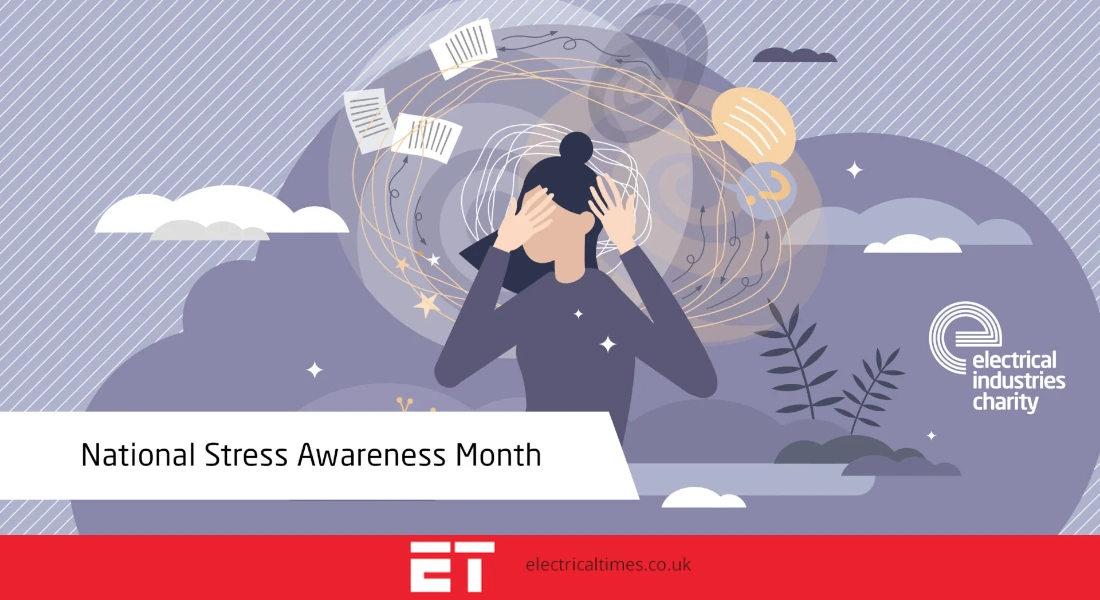We have collaborated with Electrical Industries Charity to bring a series of article for for Stress Awareness Month. This covers four key areas.
1. Know the difference stress and anxiety
2. How likely are they to affect you
3. The signs and symptoms to look out for
4. It’s ok to seek help
Below is a snippet of each of these articles and a link to Electrical Industries Charity website where you can read the full article.
Article 1: Stress vs Anxiety: Know the Difference
We’ve all heard of the terms stress and anxiety. But what exactly do they mean, and how can we tell the difference between the two?
What is stress?
Stress is something we all experience, and it’s a completely normal feeling. Stress is a physical and mental response to challenges or pressures that we face. It happens when our minds recognise a threat or a trigger.
It varies from person to person, and what one person may find stressful, another may not. It can also be positive and motivating, such as the stress that’s felt before competing in a race or giving a presentation. However, when stress becomes chronic or overwhelming, it can have negative effects on both your physical and mental health.
Read full article here: https://www.electricaltimes.co.uk/stress-vs-anxiety-know-the-difference/
Article 2. Stress and anxiety: How likely are they to affect me?
How do we measure stress?
Before we talk about how common stress is, it’s important to note that there isn’t a blood test or medical investigation that can prove or demonstrate that someone is under stress. Stress is an experience that is highly subjective and varies vastly from one individual to another.
People are affected differently by stress
We all experience the world slightly differently from each other. Some people thrive off stress, and enjoy the perceived benefits of it, for some, it can help boost or motivate their performance and will choose a profession because of this. This does not apply to everyone, and we’re all different, which is what makes us all unique. Some people may struggle with being subjected to repeated long-term stress and will have to put coping mechanisms in place to help to avoid it.
Read full article here: https://www.electricaltimes.co.uk/stress-and-anxiety-how-likely-are-they-to-affect-me/
Article 3: Stress and Anxiety: The signs and symptoms
Let’s talk about stress and anxiety, what the signs are and what a person might experience. If we recognise the signs early, we can work to try and combat it to prevent it from spiraling further.
What are the signs of stress?
Stress can result in mood changes, irritability and sometimes anger. You may notice that a person has become short tempered and snappy, and this is different to how they usually are. Other people who are stressed may describe feeling generally unhappy and can’t quite pinpoint why or it could be a feeling of being completely overwhelmed. This can result in anxious and racing thoughts. It’s important to remember that these signs occur in response to a stressful situation, and they tend to lessen when the stressor is removed or resolved.
Read full article here: https://www.electricaltimes.co.uk/stress-and-anxiety-the-signs-and-symptoms/
Article 4: Stress: It’s okay to seek help
What could happen if I don’t seek help?
For many people, stress will naturally subside as circumstances settle without any clear intervention. If stress does persist though, it’s important to identify what’s causing you stress and take steps to try to combat it. Anxiety is less likely to go away without help, and there are some risks associated with not getting the help as early as possible. Anxiety could worsen and in severe cases this could start to have a significant impact on someone’s ability to work. In these situations, the consequences of undetected and untreated anxiety can impact a person and their family.
Read full article here: https://www.electricaltimes.co.uk/stress-its-okay-to-seek-help/







